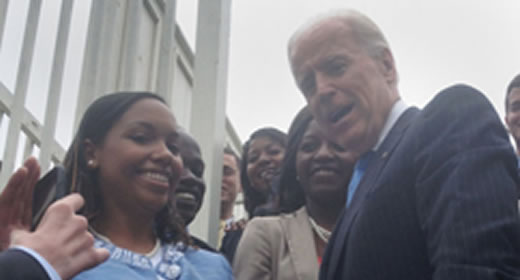
Dilara Üsküp (BA '11) put in a lot of hard work in her final semester as a Ford School student—just not at the Ford School. The new alum spent her final semester as a White House intern in the Office of National Aids Policy (ONAP). While there, she helped co-author a presidential memo "Establishing a Working Group on the Intersection of HIV/AIDS, Violence Against Women and Girls, and Gender-related Health Disparities"—another step in President Obama's National HIV/AIDS Strategy to organize federal departments and agencies around a disease that is still widespread and disproportionately affects women of color.
Dilara's interest in sexual and reproductive health issues, however, began long before her "unforgettable experience" as a White House intern. Two years ago, she travelled with Nesha Haniff, a U-M lecturer in Afro-American and African Studies and Women's Studies, as part of Pedagogy of Action. The program, now more than a decade old, takes students to South Africa to "teach an HIV module that acts to simplify the complicated nature of how HIV is taught in South Africa and demystify it."
HIV education in South Africa, Dilara continues, often emphasizes HIV literacy but doesn't necessarily account for obstacles that might stymie that goal. "There's this huge push for giving out pamphlets and programs that focus on slogans and other types of programs that push HIV literacy," she says. "You'll get stacks and stacks of paper. But in a country where illiteracy is very high. . .if it's disseminated in a way that only reaches people who are literate or only to certain communities and is not something that's easy and functional—you end up with a lot of people who have misconceptions about the disease.
"So [Haniff] developed this module where you can go over HIV in fifteen minutes. You don't use any complicated vocabulary, everything is very simple. You can teach the module to everyone from a five year old to a fifty-five year old."
Dilara also worked on the U-M campus with The Promiscuity Project, which focused on helping students understand their sexual health and participate in rapid HIV testing. Working with this kind of grassroots accessibility underscores Dilara's interests, but she says her approach to reproductive and sexual health education nevertheless began to shift after she came to the Ford School.
"I'm still interested in sexual health as a whole," she says, "but I think when I first came to college, I really was interested in more of a public health paradigm, and since then I've shifted to more of a public policy perspective—looking at issues of contraception and sexual health taught in schools. In the beginning I was interested in getting in on the ground and now I'm interested in engaging at a more macro level.
"So the Office of AIDS Policy gave me the best of both worlds: we talked to people on the ground—we'd speak to advocates, we'd come in contact with constituents, we looked at community issues—but then aggregating that up to a macro level and looking at it from a policy perspective.
The presidential memorandum was a great way to help articulate that perspective, and Dilara was able to bring her considerable experience working on HIV/AIDS and gender issues to bear on the project. Together with James Albino, Senior Program Manager at ONAP, Dilara co-authored the memo detailing the new working group that will address the intersection of HIV/AIDS, violence against women and girls, and gender-related health disparities and catalyze the efforts of multiple government agencies—including the Department of Justice, the Department of Health and Human Services, and the Department of Education—to improve HIV/AIDS data collection, research, intervention strategies, and training. Dilara notes that the federal government had already conducted various conferences and meetings in recent years regarding the relation between violence against women and HIV/AIDS—the issue had already "been in the pot." But community members and grassroots organizations still found that certain vulnerable groups had not been directly addressed in the plan.
"If you look at [President Obama's] strategy," she says, "it talks about HIV/AIDS on a larger scale, as far as reducing HIV incidence. Since this was the first strategy of its kind for HIV/AIDS, it was more like, 'let's just worry about the epidemic as a whole and women and communities of color—they will be handled by this larger policy.'
"But the community had its concerns," she continues. "When you talk to a lot of people who may not know the literature, they think HIV/AIDS is only really salient in Africa or certain parts of the Middle East—that we don't have this issue with violence against women and contracting HIV as a result or women becoming victims of violence at higher rates because they have disclosed their HIV status. We don't think of that as being an American issue. And so it was important for James and I and the other staff members at the Domestic Policy Council to rally behind the memorandum."
Dilara will continue to rally around issues affecting "groups that are often unheard and unseen" as a political science doctoral student at the University of Chicago. Her research will focus on women's reproductive rights, specifically contraception and why it remains a politicized issue in the twenty-first century. She has no intention of becoming an ivory tower academic, however. Dilara sees herself in the future as a public intellectual—beneficial in the classroom and producing work that helps shape good policy.